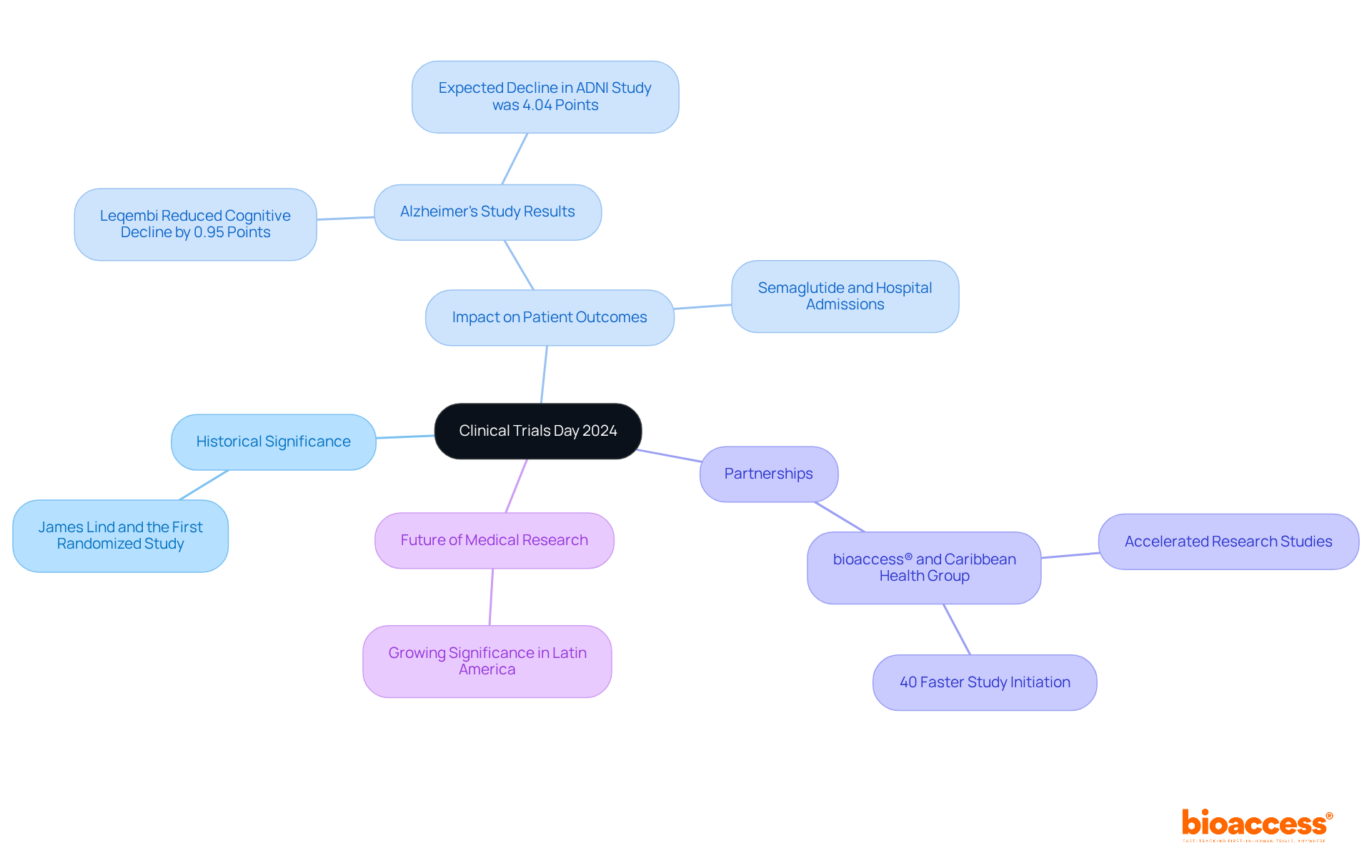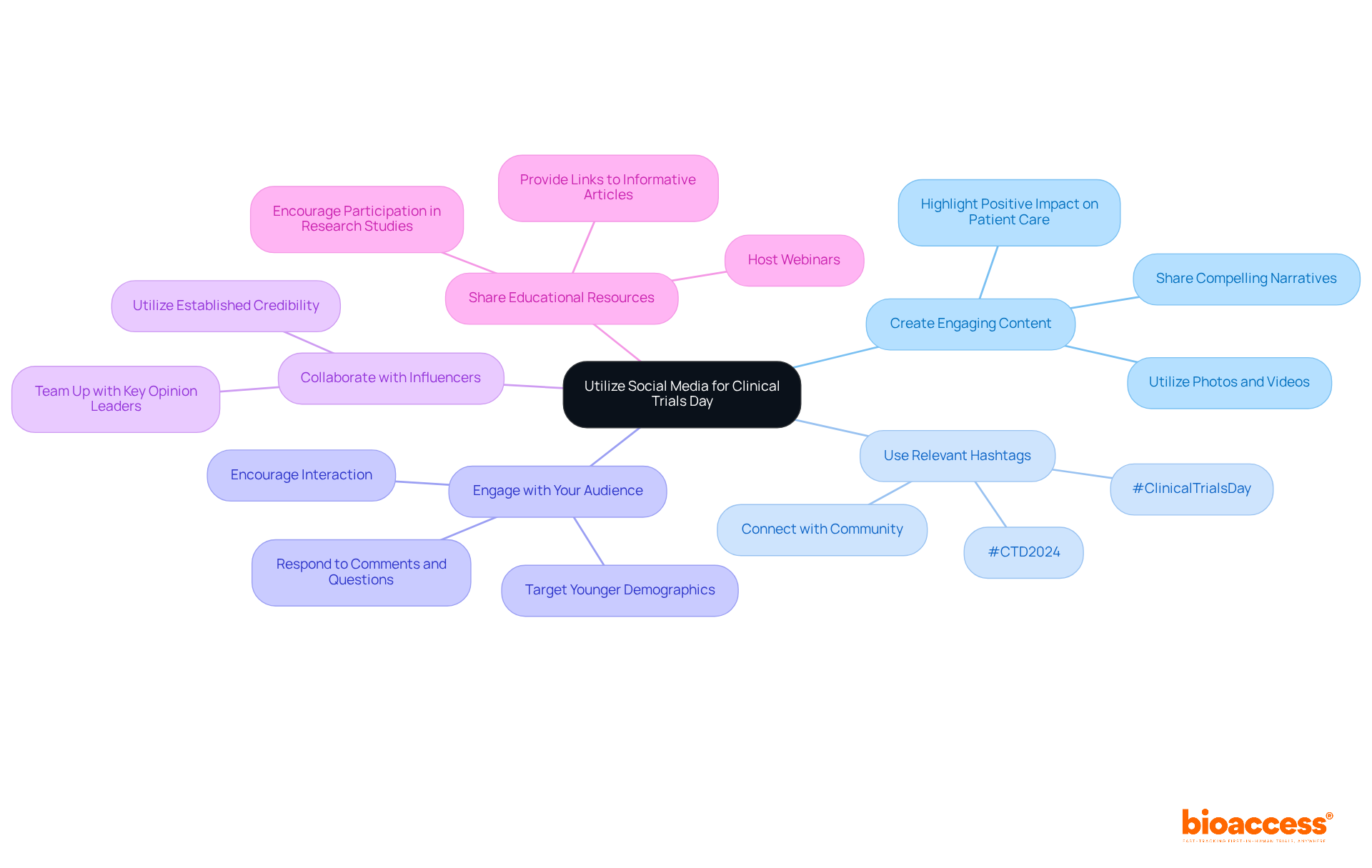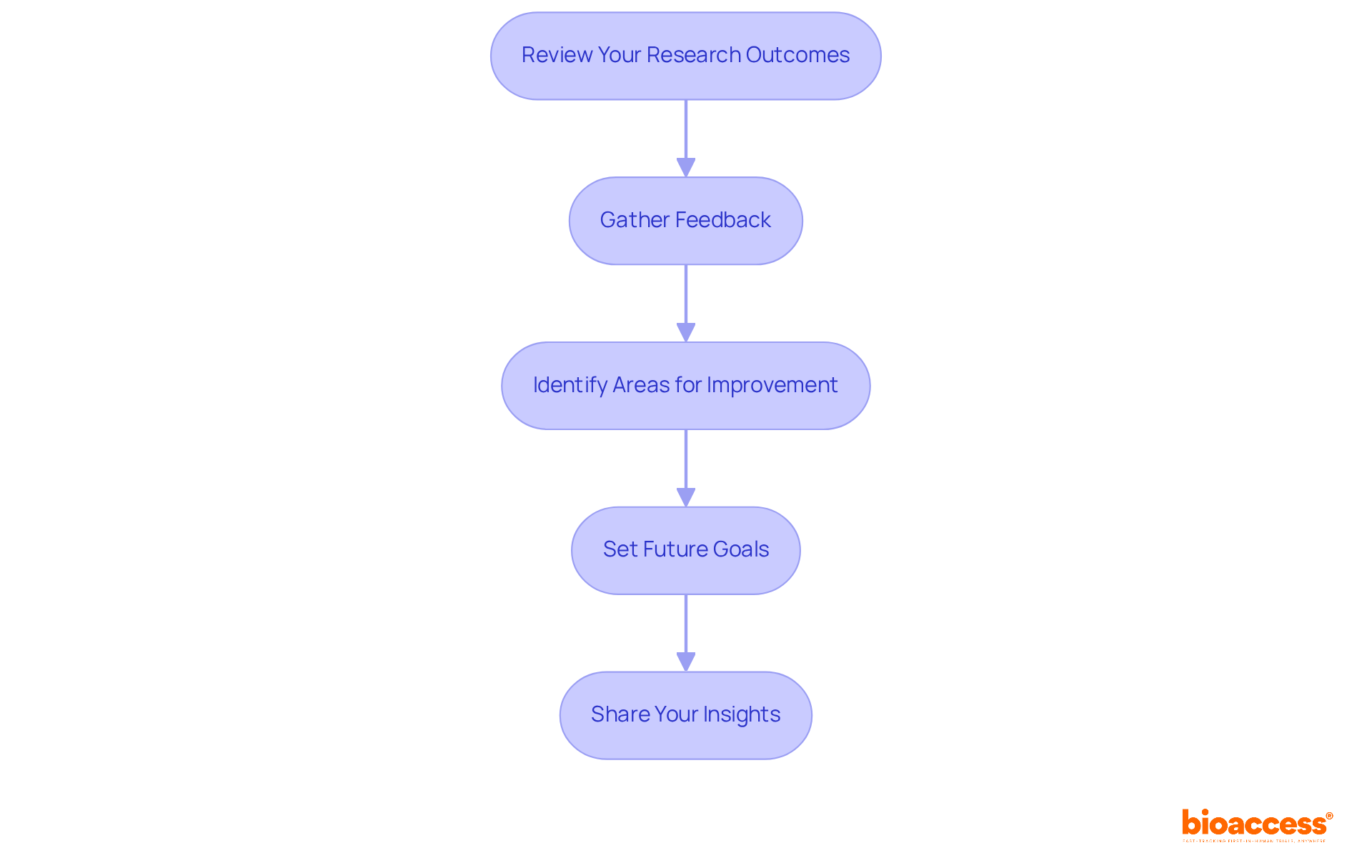


Clinical Trials Day 2024 serves as a pivotal occasion to honor the invaluable contributions of clinical research, while simultaneously fostering greater public engagement and awareness in medical studies. This article delineates various strategies for participation, including:
These initiatives are designed to cultivate a collaborative environment that significantly enhances both the effectiveness and visibility of clinical trials.
By actively engaging the public, we not only highlight the importance of clinical research but also address the challenges faced within the Medtech landscape. It is essential to consider how organizations can effectively communicate their roles in overcoming these obstacles. The strategies outlined herein are not merely suggestions; they represent a call to action for all stakeholders involved in clinical research.
In conclusion, the importance of collaboration in clinical trials cannot be overstated. As we look ahead, it is crucial for all parties to come together and implement these strategies, ensuring that the contributions of clinical research are recognized and celebrated.
Celebrating Clinical Trials Day on May 20 honors the groundbreaking contributions of pioneers like James Lind and highlights the essential role of clinical research in shaping modern medicine. This day serves as a crucial reminder of the significant advancements in medical science and the ongoing need for public engagement in research initiatives.
As the healthcare landscape evolves, researchers must consider how to effectively foster awareness and participation in clinical trials. This engagement is vital to ensure that advancements in treatment and patient care continue to flourish.
Clinical Trials Day, observed on May 20, serves to honor the pioneering work of James Lind, who conducted the first randomized study in 1747. This day underscores the vital role that research trials play in advancing medical knowledge and enhancing patient outcomes. It provides a platform for scholars, supporters, and the community to acknowledge the invaluable contributions of healthcare professionals. Engaging in this celebration not only raises awareness about the complexities of medical research but also encourages greater participation in forthcoming studies.
Statistics reveal that successful medical studies have significantly improved outcomes for patients. For instance, recent advancements in treatments have led to a remarkable reduction in cognitive decline among individuals with Alzheimer's disease, as demonstrated by the Phase III CLARITY AD study, which indicated a 0.95-point decrease on the Clinical Dementia Rating scale. Such outcomes highlight the critical importance of medical studies in the development of innovative treatments and therapies, ultimately fostering a healthier future for all.
Moreover, bioaccess® is committed to accelerating research studies for Medtech, Biopharma, and Radiopharma startups, ensuring they navigate the complexities of regulatory approval and patient recruitment efficiently, achieving study initiation 40% faster. The partnership between bioaccess™ and Caribbean Health Group aims to position Barranquilla as a key hub for health studies in Latin America, supported by Colombia's Minister of Health, further emphasizing the region's growing significance in international medical research. This strategic collaboration has already yielded promising results, including a notable reduction in recruitment time and high retention rates, demonstrating the effectiveness of bioaccess's approach in enhancing research processes.

To enhance involvement on Clinical Trials Day, researchers should contemplate a range of activities and events that foster awareness and participation in research studies. Here are some effective strategies:
By implementing these activities, researchers can significantly contribute to raising awareness and participation in clinical trials, ultimately benefiting the broader healthcare community.

Social media platforms present a powerful avenue to celebrate Clinical Trials Day and disseminate valuable insights to a broader audience. To maximize your social media presence, consider the following effective strategies:
Additionally, consider the cost-effectiveness of social media recruitment, where researchers spend between $0 to $517 per participant compared to $19 to $777 for traditional methods. This highlights the financial benefits of leveraging social media for recruitment efforts. Moreover, using social media can also help emphasize media attention on research studies in Latin America and Colombia, demonstrating the significance of these investigations and promoting wider involvement. By applying these strategies, you can successfully commemorate Clinical Trials Day 2024 while also boosting awareness and involvement in research studies.

As Clinical Trials Day 2024 approaches, it is essential to evaluate your contributions to medical studies. Consider these key steps to assess the impact of your work:

Celebrating Clinical Trials Day 2024 presents an invaluable opportunity to recognize the significant contributions of research in advancing healthcare. By honoring the legacy of pioneers like James Lind, this day emphasizes the essential role that clinical trials play in enhancing patient outcomes and fostering medical innovation. Engaging in this celebration not only raises awareness about the complexities of research but also encourages broader participation in future studies, ultimately benefiting the entire healthcare community.
The article outlines several strategies for effective participation in Clinical Trials Day, including:
These activities not only promote awareness but also foster collaboration and inspire the next generation of researchers. By leveraging social media, researchers can amplify their messages, connect with diverse audiences, and encourage greater involvement in clinical trials, showcasing the importance of these studies in improving health outcomes.
As Clinical Trials Day 2024 approaches, it is crucial for researchers and healthcare professionals to actively engage in these initiatives. By reflecting on their contributions and sharing insights, they can cultivate a culture of continuous improvement and collaboration within the clinical research community. This collective effort not only honors the past but also paves the way for future advancements in medical research, ultimately leading to a healthier future for all.
What is Clinical Trials Day and when is it observed?
Clinical Trials Day is observed on May 20 and serves to honor the pioneering work of James Lind, who conducted the first randomized study in 1747.
Why is Clinical Trials Day important?
Clinical Trials Day underscores the vital role that research trials play in advancing medical knowledge and enhancing patient outcomes. It raises awareness about the complexities of medical research and encourages greater participation in forthcoming studies.
What impact have successful medical studies had on patient outcomes?
Successful medical studies have significantly improved patient outcomes, such as the recent advancements in treatments that led to a reduction in cognitive decline among individuals with Alzheimer's disease, as shown by the Phase III CLARITY AD study.
What specific results did the Phase III CLARITY AD study demonstrate?
The Phase III CLARITY AD study indicated a 0.95-point decrease on the Clinical Dementia Rating scale, highlighting the critical importance of medical studies in developing innovative treatments.
How does bioaccess® contribute to clinical research?
Bioaccess® is committed to accelerating research studies for Medtech, Biopharma, and Radiopharma startups by helping them navigate regulatory approval and patient recruitment efficiently, achieving study initiation 40% faster.
What is the partnership between bioaccess™ and Caribbean Health Group focused on?
The partnership aims to position Barranquilla as a key hub for health studies in Latin America, supported by Colombia's Minister of Health, emphasizing the region's growing significance in international medical research.
What results have been achieved through the collaboration between bioaccess™ and Caribbean Health Group?
The collaboration has yielded promising results, including a notable reduction in recruitment time and high retention rates, demonstrating the effectiveness of bioaccess's approach in enhancing research processes.